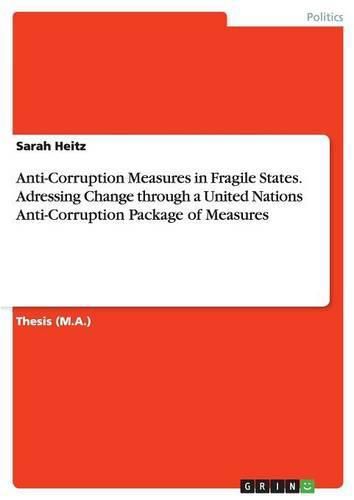Readings Newsletter
Become a Readings Member to make your shopping experience even easier.
Sign in or sign up for free!
You’re not far away from qualifying for FREE standard shipping within Australia
You’ve qualified for FREE standard shipping within Australia
The cart is loading…






Thesis (M.A.) from the year 2009 in the subject Politics - International Politics - Topic: Miscellaneous, grade: 1,1, University of Augsburg, language: English, abstract: Designing and implementing a national anti-corruption strategy is a long-term and expensive undertaking that will almost always require the assistance of the international community. This study does not explicitly provide recommendations for anti-corruption approaches of donors and/or agencies in fragile states, key elements are pointed out where they strongly affect the recipient governments’ political will and capacity for anti-corruption reform. Since the package of measures intends to provide governments with a range of options that enable them to assemble their national strategy, this paper is streamlined to anti-corruption measures in post-emergency or reconstruction phases of emergency situations. Against the background of corruption, this thesis is based on the following structure; it starts with the international level, followed by the transnational and then national level. It then reverses back through the same levels. Chapter 2 sketches anti-corruption efforts by the international community and integrates them into the larger context of development and intervention policy. In addition the chapter outlines certain features of the UNCAC and depicts the work of the CECS. Due to the complexity of the phenomenon of corruption, chapter 3 provides a general background of corruption and profiles the many aspects of government corruption. It then outlines the (anti-) corruption situation and condition in fragile states, the principles of addressing corruption in such environments and the broader principles of an anti-corruption strategy. Chapter 4 intends to exemplify an anti-corruption approach in one country. It highlights key elements of the anti-corruption strategy to examine how they work in practice and to unveil the complexity of such a strategy. It points out the methodology of the cou
$9.00 standard shipping within Australia
FREE standard shipping within Australia for orders over $100.00
Express & International shipping calculated at checkout
Thesis (M.A.) from the year 2009 in the subject Politics - International Politics - Topic: Miscellaneous, grade: 1,1, University of Augsburg, language: English, abstract: Designing and implementing a national anti-corruption strategy is a long-term and expensive undertaking that will almost always require the assistance of the international community. This study does not explicitly provide recommendations for anti-corruption approaches of donors and/or agencies in fragile states, key elements are pointed out where they strongly affect the recipient governments’ political will and capacity for anti-corruption reform. Since the package of measures intends to provide governments with a range of options that enable them to assemble their national strategy, this paper is streamlined to anti-corruption measures in post-emergency or reconstruction phases of emergency situations. Against the background of corruption, this thesis is based on the following structure; it starts with the international level, followed by the transnational and then national level. It then reverses back through the same levels. Chapter 2 sketches anti-corruption efforts by the international community and integrates them into the larger context of development and intervention policy. In addition the chapter outlines certain features of the UNCAC and depicts the work of the CECS. Due to the complexity of the phenomenon of corruption, chapter 3 provides a general background of corruption and profiles the many aspects of government corruption. It then outlines the (anti-) corruption situation and condition in fragile states, the principles of addressing corruption in such environments and the broader principles of an anti-corruption strategy. Chapter 4 intends to exemplify an anti-corruption approach in one country. It highlights key elements of the anti-corruption strategy to examine how they work in practice and to unveil the complexity of such a strategy. It points out the methodology of the cou